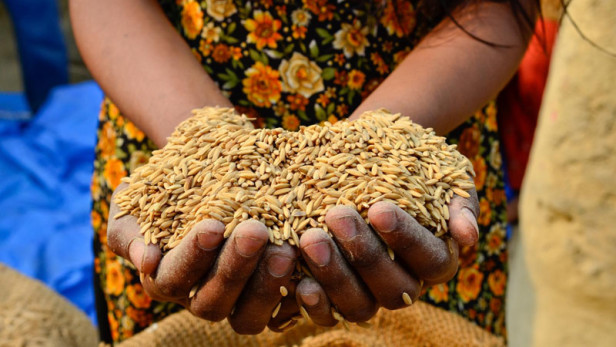Food security equals national security

Prosper Ndlovu
CLIMATE change is increasingly becoming a ‘security threat’ the world over amid speculation that failure to manage it may increase the risk of violent conflict.
Scholars Jon Barnett and Neil Adger in “Climate Change, Human Security and Violent Conflict” argue that climate change has an effect of compromising stability and nations’ ability to produce enough food, which affects livelihoods thus creating a breeding ground for conflict. To them climate change increasingly undermines human security in the present day, and will increasingly do so in the future as it reduces access to and the quality of natural resources that are important to sustain livelihoods.
Food security is one such fundamental human security element that every state has to protect jealously as part of the well being of its citizens. Over the years developing countries facing acute food shortages, including Zimbabwe, have relied on foreign funded donor handouts to feed their citizens and revitalise their agriculture sectors. While this is critical from a humanitarian perspective, analysts warn that food security is too important to be left to the generosity of external partners.
Zimbabwe’s Command Agriculture initiative is best understood within this national security framework. For a country that has suffered repeated incidents of droughts due to a shift in rainfall patterns, the need for a robust food production model that will ensure the nation does not starve cannot be overemphasised.
In view of climate change there is no guarantee that the country would continue receiving good rains like the 2016/17 season. This stresses the need for Government and the private sector to invest more resources in building more dams for water harvesting and developing a sound irrigation infrastructure that will support food production during dry periods.
The Command Agriculture scheme is one comprehensive programme that Government has undertaken since the land reform programme that aims to ensure the country produces adequate grains to feed the whole nation even under drought conditions.
Vice President Emmerson Mnangagwa, who leads the Cabinet committee on food security and nutrition, has said the programme encompasses construction of dams across the country and use of existing water bodies to support irrigation farming.
“We have a programme where this country will never have hunger issues again. We need 400 000 hectares of land to produce two million tonnes of grain. Of that two million tonnes, 1,5 million tonnes will be adequate to feed this nation and 500 000 tonnes will be strategic grain, that we put in strategic reserve,” said VP Mnangagwa recently.
“At the moment we have irrigation facilities countrywide to irrigate up to 159 000 hectares. We want to develop this, by the next season to 200 000 hectares. Down the line, we must increase hectarage that will be under irrigation to 400 000 hectares. When we get there, it means even if there is drought, we can still irrigate 400 000 hectares and have enough grain to feed the nation.”
According to Agriculture, Mechanisation and Irrigation Development Minister, Dr Joseph Made, the agricultural sector is expected to grow by 12 percent this year buoyed by a bumper harvest expected this season, with early projections showing the country could produce over 2,8 million tonnes of cereals and other food crops.
Growth is expected to be spurred by mostly tobacco, cotton, sugarcane, cereals, dairy and beef. Other food crops (groundnuts, sunflower, sugar beans, round nuts, soya beans, sweet potatoes, cowpeas and rice) are also expected to surpass 350 000 metric tonnes, said the minister.
As a result of the Command Agriculture initiative and the Presidential input scheme, Dr Made said the total area under maize had increased by 52 percent from 1 161 997 hectares in 2015/2016 to 1 770 389 in 2016/2017.
The revival of the agriculture sector is critical for enhancing country’s national security and economic well being, a thrust that is at the heart of Zim-Asset, the country’s five year economic blueprint, under the food security and nutrition cluster. This drive also speaks to manufacturing industry growth through provision of key raw materials and the broader value addition and beneficiation thrusts. Public Private Partnerships (PPPs) play a key role in this matrix as they add impetus in job creation and fast-tracking attainment of long term sustainable development targets, which form the bedrock of human security.
Policy leaders and military strategists are increasingly becoming aware that the legitimacy of national security is under threat if thousands of citizens are vulnerable to hunger and poverty. Often it is these threats that drive many to commit crime or cross borders even when there is no armed conflict.
In November 2014 Zimbabwe National Army (ZNA) Commander Lieutenant-General Philip Valerio Sibanda alluded to the urgency for Africa to address human security issues such as poverty, hunger, health and unemployment so as to curb growing incidents of strife and political instability on the African continent.
He observed that focusing on political power alone without improving human standards of living was not helpful as it leaves multitudes suffering, thus brewing tension in society.
“Contemporary challenges facing Africa and mankind in general centre on human security. These challenges are often ignored as they are often relegated to the periphery. Our focus has traditionally been entrenched on issues of politics, defence and security. In recent times, human security has taken centre stage,” said Lt Gen Sibanda in a speech to mark the official opening of the 31st Sadc Defence Intelligence Standing Committee in Victoria Falls.
“The burden of conflicts results in under-development, poverty, hunger and disease. Equally, mismanagement of our heritage, God-given resources, and indeed our governed territories can create these adverse human conditions. Global warming with its attendant consequences, depleting water resources, deforestation, desertification are challenges that confront governments.”
The sentiments by Lt Gen Sibanda have been backed by studies, which have also shown that failure by governments to respond to human security issues has largely contributed to conflict.
According to the 2017 United Nations Food and Agricultural Organisation (FAO) report, global food securities concerns persist despite efforts by countries eradicate hunger and malnutrition, which have a strong linkage with poverty. The report says some 795 million people still suffer from hunger and more than two billion from micro-nutrient deficiencies or forms of over nourishment.
While gains have been made in productivity and technological advances, José Graziano da Silva, the director-general of FAO says a huge gap still remains in attaining the food security and nutrition ideal.
He warns that “global food security could be in jeopardy, due to mounting pressures on natural resources and to climate change, both of which threaten the sustainability of food systems at large”.
Examples abound of how donor support always comes with strings attached. Often donor agents have been accused of working as spies on communities they purport to help and using the donor leeway to undermine sitting governments. Such experiences stress the need for African governments in particular, to give serious attention and allocate more resources to food security programmes just as they do in beefing up their security apparatus.
It is in light of the above that Zimbabwe and Africa as a whole need to move swiftly in harnessing required resources to support increased farm production without relying on rain-fed cropping. For unless the continent is food secure its claim of sovereignty and self determination will always be threatened.









Comments